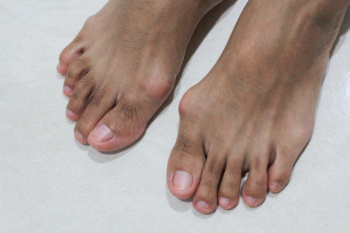
A bunion is a bony bump that forms at the base of the big toe, causing the toe to angle toward the second toe. This misalignment can lead to pain, swelling, redness, and difficulty wearing shoes. In more severe cases, bunions can limit mobility and cause deformities in the foot structure. The main causes of bunions include wearing tight or high-heeled shoes, inherited foot structure, and abnormal foot mechanics, such as flat feet. Over time, pressure on the joint can cause the toe to shift, forming a bunion. Treatment options vary depending on severity. In mild cases, changing footwear or using orthotics can relieve pain and prevent progression. For more advanced cases, a podiatrist may recommend medications, targeted exercises, or even surgery to realign the toe. If you are dealing with bunion pain or discomfort, it is suggested that you schedule an appointment with a podiatrist to discuss the best treatment plan tailored to your needs.
If you are suffering from bunions, contact Evan Young, DPM of Trinity Foot & Ankle . Our doctor can provide the care you need to keep you pain-free and on your feet.
What Is a Bunion?
A bunion is formed of swollen tissue or an enlargement of boney growth, usually located at the base joint of the toe that connects to the foot. The swelling occurs due to the bones in the big toe shifting inward, which impacts the other toes of the foot. This causes the area around the base of the big toe to become inflamed and painful.
Why Do Bunions Form?
Genetics – Susceptibility to bunions are often hereditary
Stress on the feet – Poorly fitted and uncomfortable footwear that places stress on feet, such as heels, can worsen existing bunions
How Are Bunions Diagnosed?
Doctors often perform two tests – blood tests and x-rays – when trying to diagnose bunions, especially in the early stages of development. Blood tests help determine if the foot pain is being caused by something else, such as arthritis, while x-rays provide a clear picture of your bone structure to your doctor.
How Are Bunions Treated?
- Refrain from wearing heels or similar shoes that cause discomfort
- Select wider shoes that can provide more comfort and reduce pain
- Anti-inflammatory and pain management drugs
- Orthotics or foot inserts
- Surgery
If you have any questions, please feel free to contact our office located in Trinity, FL . We offer the newest diagnostic and treatment technologies for all your foot care needs.
